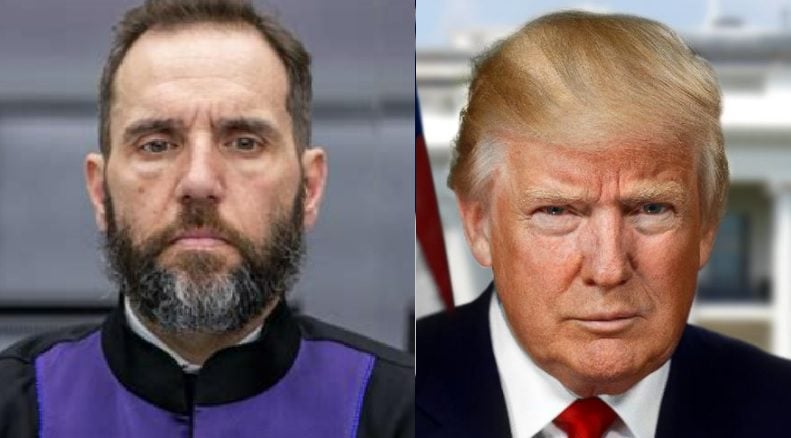Nineteen retired generals, admirals, and former top civilian defense officials have filed a brief with the U.S. Supreme Court, opposing former President Donald Trump’s plea for immunity from prosecution, claiming that granting such a request would pose a significant threat to national security.
The Supreme Court is set to deliberate on Trump’s presidential immunity argument on April 25, as reported by The Gateway Pundit.
The Supreme Court will deliberate on whether a president can be shielded from legal consequences for actions taken while in office. The decision, which may not arrive until late June, according to analysts, has significant repercussions for the timeline of Special Counsel Jack Smith’s case against Trump, potentially delaying the trial’s start until after the 2024 election.
President Trump’s legal team requested the Supreme Court to put a hold on the immunity decision related to Jack Smith’s January 6 case in Washington, D.C. This came after a federal appeals court, influenced by appointees of Joe Biden, had denied Trump immunity.
The three-judge panel of the DC Circuit Court of Appeals, consisting of Judges Florence Pan, Michelle Childs (both Biden appointees), and Karen Henderson (a George W. Bush appointee), emphasized the importance of allowing the prosecution to move forward, citing the public’s interest and the structure of the government.
Trump’s lawyers have fervently argued that a former president is immune from federal prosecution for alleged offenses committed while holding office.
“In 234 years of American history, no president ever faced criminal prosecution for his official acts. Until 19 days ago, no court had ever addressed whether immunity from such prosecution exists,” Trump’s lawyers wrote, according to CBS News. “To this day, no appellate court has addressed it. The question stands among the most complex, intricate, and momentous issues that this Court will be called on to decide.”
On Monday, a group of retired military officers, including former four-star generals and admirals as well as past secretaries of the U.S. military branches, filed an amicus brief with the Supreme Court.
The group warns of the alleged threats to national security and democratic principles if former President Donald J. Trump’s claims of presidential immunity for official acts were to be accepted.
The 38-page brief, which includes signatures from officials who have served under both Democratic and Republican administrations dating back to the era of former President John F. Kennedy, cautions that Trump’s legal theory could set a dangerous precedent.
Among the signatories include:
Ray Mabus, former secretary of the Navy;
retired Air Force Gen. Michael Hayden, who also served as CIA director;
retired Army Gens. George Casey and Peter Chiarelli;
retired Air Force Gens. John Jumper, Craig McKinley, and Charles Wald;
retired Marine Corps Gens. Carlton Fulford, Charles Krulak, and Robert Magnus;
retired Navy Adms. Steve Abbot, Samuel Jones Locklear, John Nathman, Bill Owens, and Scott Swift;
and retired Coast Guard Adm. Thad Allen.
They are joined by former civilian defense officials, including Louis Caldera, Deborah Lee James, and Sean O’Keefe.
Should the theory of absolute immunity prevail, the group argues, it will “risk jeopardizing America’s standing as a guardian of democracy in the world and further feeding the spread of authoritarianism, thereby threatening the national security of the United States and democracies around the world.”
The retired military officials also expressed concerns about the potential chaos and security risks that could arise if a President faced no accountability for criminal actions aimed at obstructing a peaceful transition of power.
They highlight scenarios where conflicting directives from the Joint Chiefs of Staff could endanger service members and jeopardize America’s national security and leadership role in the world.
In conclusion, the retired four-star admirals and generals, alongside former military secretaries, urge the rejection of the claimed immunity, emphasizing the critical need to uphold the rule of law, accountability, and the peaceful transition of power to safeguard national security and democratic principles.
It should be noted that the U.S. Supreme Court has addressed presidential immunity in several landmark cases, including the Nixon v. Fitzgerald (1982)
This case directly addressed presidential immunity. The Supreme Court ruled that the President is entitled to absolute immunity from civil liability for actions taken within the official duties of the presidency. This means that while in office, the President cannot be sued for damages related to official actions.
Read the amicus brief below:
The post 19 Retired Generals, Admirals, and Former Top Defense Officials File Supreme Court Brief Against President Trump’s Immunity Bid, Claiming Trump’s Act “Threatens National Security” appeared first on The Gateway Pundit.







